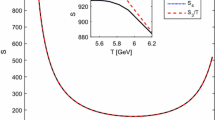Abstract
Signals from millisecond pulsars, being exceptionally accurate clocks, are sensitive to a cosmic background of gravitational waves1–3. Present measurements imply that the the energy density in such waves in an octave bandwidth near 10−7 Hz must be ≲10−3 of the closure density2. Gravitational waves of these frequencies may be produced by a variety of sources of astrophysical or cosmological interest3,4. I investigate here the sensitivity of a millisecond pulsar timing signal to the background of gravitational waves expected from an inflationary phase of expansion during the early Universe5. The spectrum of such waves, which is flat, extends up to and beyond periods of the order of the present Hubble time. As such, their amplitude can be constrained by measurements of the present quadrupole anisotropy of the black-body background6–8. I demonstrate here that the bound on inflation derived from millisecond pulsar timing measurements2 is, at present, much weaker than this bound. However, the millisecond pulsar bound should, with new technology and the possible discovery of new pulsars, improve dramatically and it may eventually surpass the present quadrupole bound. It is in principle sensitive to the shape of the gravitational wave spectrum and can thus serve as a stronger test of inflationary predictions.9–11 A positive millisecond pulsar signal can also be used to measure photon reheating processes in the early Universe below temperatures of the order of 100 MeV.
Similar content being viewed by others
References
Bertotti, B., Carr, B. J. & Rees, M. J. Mon. Not. R. astr. Soc. 203, 945–954 (1983).
Taylor, J., Preprint, Pulsar Timing, Millisecond Pulsars, and Gravitational Waves (Princeton University, 1984).
Witten, E. Phys. Rev. D 30, 272–285 (1984).
Turok, N. Santa Barbara Preprint TH-3 (1984).
Starobinskii, A. A. JETP Lett. 30, 682–685 (1979).
Rubokov, V. A., Sazhin, M. V. & Veraskin, A. V. Phys. Lett. 115 B, 189–192 (1982).
Fabbri, R. & Pollock, M. D. Phys. Lett. 125 B, 445–448 (1983).
Abbott, L. F. & Wise, M. B. Cal-Tech Preprint, CALT-68-1100 (1984).
Guth, A. Phys. Rev. D23, 347–360 (1981).
Linde, A. D. Phys. Lett. 108 B, 389–392 (1982).
Albrecht, A. & Steinhardt, P. J. Phys. Rev. Lett. 48, 1220–1224 (1982).
Detweiler, S. Astrophys. J. 234, 1100–1107 (1979).
Yang, J., Turner, M. S., Steigman, G., Schramm, D. N. & Olive, K. Astrophys. J. (in the press).
Weinberg, S. Phys. Rev. Lett. 48, 569–573 (1982).
Krauss, L. M. Nucl. Phys. B229, 556–567 (1983).
McKellar, B. H. J. & Pavasa, S. University of Hawaii Preprint UH-511-536-84.
Lindley, D. Mon. Not. R. astr. Soc. 188, 15P–19P (1979).
Krauss, L. M. Harvard University Preprint, HUTP-84/A050 (1984).
Author information
Authors and Affiliations
Rights and permissions
About this article
Cite this article
Krauss, L. Millisecond pulsars, gravitational waves and the inflationary universe. Nature 313, 32–33 (1985). https://doi.org/10.1038/313032a0
Received:
Accepted:
Issue Date:
DOI: https://doi.org/10.1038/313032a0
- Springer Nature Limited
This article is cited by
-
Upper limits on the cosmological gravitational wave background and maser clocks in space
General Relativity and Gravitation (1995)
-
Propagation of electromagnetic radiation in a random field of gravitational waves and space radio interferometry
Il Nuovo Cimento B (1990)
-
Inflation and shadow matter
Nature (1986)
-
New gravitational tests of early universe cosmology
General Relativity and Gravitation (1986)





